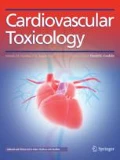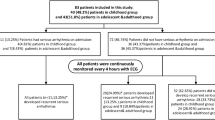Abstract
Tricyclic antidepressants are used to treat a variety of mental disorders, and are considered a common cause of fatal drug poisoning. This study reports a young woman with no history of cardiac diseases who presented to the emergency department with heart palpitation, weakness, and lethargy. After a short period of time, she became unconscious and experienced hypotension and refractory arrhythmia, finally being diagnosed with imipramine poisoning. Accurate history taking and the possible causes of these complications including cardio-toxic drug poisoning should be considered in such patients.




Similar content being viewed by others
References
Marland, G., Snowden, A., McNay, L., McCaig, M., & Boyd, G. (2011) Tricyclic antidepressant self-poisoning and admission for acute care. British Journal of Cardiac Nursing, 6(12), 589–596.
Sahraeizadeh, A. (2016). Impending cardiogenic shock due to tricyclic antidepressant toxicity, computed tomography findings; a case report. Health Sciences, 5(8), 264–266.
Amiri, H., Zamani, N., Hassanian-Moghaddam, H., & Shadnia, S. (2016). Cardiotoxicity of tricyclic antidepressant treated by 2650 mEq sodium bicarbonate: A case report. JRSM Cardiovascular Disease, 5, 2048004016682178.
Moradi, M., Ghaemi, K., & Mehrpour, O. (2016). A hospital base epidemiology and pattern of acute adult poisoning across Iran: A systematic review. Electronic Physician, 8(9), 2860.
Alinejad, S., Zamani, N., Abdollahi, M., & Mehrpour, O. (2017) A narrative review of acute adult poisoning in Iran. Iranian Journal of Medical Sciences, 41(2), 327–346.
Taghaddosinejad, F., Sheikhazadi, A., Yaghmaei, A., Mehrpour, O., & Schwake, L. (2012). Epidemiology and treatment of severe poisoning in the intensive care unit: Lessons from a One-year prospective observational study. The Journal of Clinical Toxicology, 1, 2161–2495.
Kane, M. D., Kathleen, E., Kane, M. D., Bryan, G., Pierog, D. O., Jessica, E., Donovan, J. W., & Helmick, R. N. (2009). Tricyclic antidepressant toxicity treated with massive sodium bicarbonate. The American Journal Of Emergency Medicine, 27(9), 3.
Lee, A., & Pickham, D. (2016) Basic cardiac electrophysiology and common drug-induced arrhythmias. Critical Care Nursing Clinics of North America, 28(3):357–371.
Nada, A., Gintant, G. A., Kleiman, R., Gutstein, D. E., Gottfridsson, C., Michelson, E. L., et al. (2013). The evaluation and management of drug effects on cardiac conduction (PR and QRS intervals) in clinical development. American Heart Journal, 165(4), 489–500.
Teply, R. M., Packard, K. A., White, N. D., Hilleman, D. E., & DiNicolantonio, J. J. (2016). Treatment of depression in patients with concomitant cardiac disease. Progress in Cardiovascular Diseases, 58(5), 514–528.
Buckley, N. A., Chevalier, S., Leditschke, I. A., O’Connell, D. L., Leitch, J., & Pond, S. M. (2003). The limited utility of electrocardiography variables used to predict arrhythmia in psychotropic drug overdose. Critical Care, 7(5), R101.
Sanaei-Zadeh, H., & Toussi, A. G. (2011). Resolution of wide complex tachycardia after administration of hypertonic sodium bicarbonate in a patient with severe tricyclic antidepressant poisoning. Resuscitation, 82(6), 792–793.
Sabah, K. M., Chowdhury, A. W., Islam, M. S., Saha, B. P., Kabir, S. R., & Kawser, S. (2017). Amitriptyline-induced ventricular tachycardia: A case report. BMC Research Notes, 10(1), 286.
Wu, C. S., Tsai, Y. T., Hsiung, C. A., & Tsai, H. J. (2017). Comparative risk of ventricular arrhythmia and sudden cardiac death across antidepressants in patients with depressive disorders. Journal of Clinical Psychopharmacology, 37(1), 32–39.
Author information
Authors and Affiliations
Corresponding author
Additional information
Handling Editor: Y. James Kang.
Rights and permissions
About this article
Cite this article
Azdaki, N., Nakhaee, S., Zamani, N. et al. Refractory Arrhythmias in a Young Patient Poisoned by Imipramine. Cardiovasc Toxicol 19, 90–93 (2019). https://doi.org/10.1007/s12012-018-9477-8
Published:
Issue Date:
DOI: https://doi.org/10.1007/s12012-018-9477-8




